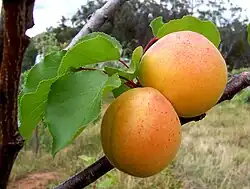абрикоса
Russian
Pronunciation
- IPA(key): [ɐbrʲɪˈkosə]
Ukrainian

абрикоси
Pronunciation
- IPA(key): [ɐbreˈkɔsɐ]
Audio (file)
Etymology 1
Borrowed from Polish aprykoza, from German Aprikose, from Dutch abrikoos, from French abricot, from Spanish albaricoque, from Arabic اَلْبَرْقُوق (al-barqūq), from Ancient Greek πραικόκιον (praikókion), from Latin praecox. Doublet of абрико́с (abrykós).[1]
Noun
абрико́са • (abrykósa) f inan (genitive абрико́си, nominative plural абрико́си, genitive plural абрико́с, relational adjective абрико́совий or абрико́сний)
Declension
Declension of абрико́са (inan hard fem-form accent-a)
| singular | plural | |
|---|---|---|
| nominative | абрико́са abrykósa |
абрико́си abrykósy |
| genitive | абрико́си abrykósy |
абрико́с abrykós |
| dative | абрико́сі abrykósi |
абрико́сам abrykósam |
| accusative | абрико́су abrykósu |
абрико́си abrykósy |
| instrumental | абрико́сою abrykósoju |
абрико́сами abrykósamy |
| locative | абрико́сі abrykósi |
абрико́сах abrykósax |
| vocative | абрико́со abrykóso |
абрико́си abrykósy |
Etymology 2
See the etymology of the corresponding lemma form.
References
- Melnychuk, O. S., editor (1982), “абрикос”, in Етимологічний словник української мови [Etymological Dictionary of the Ukrainian Language] (in Ukrainian), volumes 1 (А – Г), Kyiv: Naukova Dumka, page 39
- Rusanivskyi, V. M., editor (2010), “абрикоса”, in Словник української мови: у 20 т. [Dictionary of the Ukrainian Language: in 20 vols] (in Ukrainian), volumes 1 (а – бязь), Kyiv: Naukova Dumka, →ISBN
- “абрикоса”, in Горох – Словозміна [Horokh – Inflection] (in Ukrainian)
Further reading
- Bilodid, I. K., editor (1970–1980), “абрикоса”, in Словник української мови: в 11 т. [Dictionary of the Ukrainian Language: in 11 vols] (in Ukrainian), Kyiv: Naukova Dumka
- A. Rysin, V. Starko, Yu. Marchenko, O. Telemko, et al. (compilers, 2007–2022), “абрикоса”, in Russian-Ukrainian Dictionaries
- A. Rysin, V. Starko, et al. (compilers, 2011–2020), “абрикоса”, in English-Ukrainian Dictionaries
- “абрикоса”, in Kyiv Dictionary (in English)
- “абрикоса”, in Словник.ua [Slovnyk.ua] (in Ukrainian)
This article is issued from Wiktionary. The text is licensed under Creative Commons - Attribution - Sharealike. Additional terms may apply for the media files.